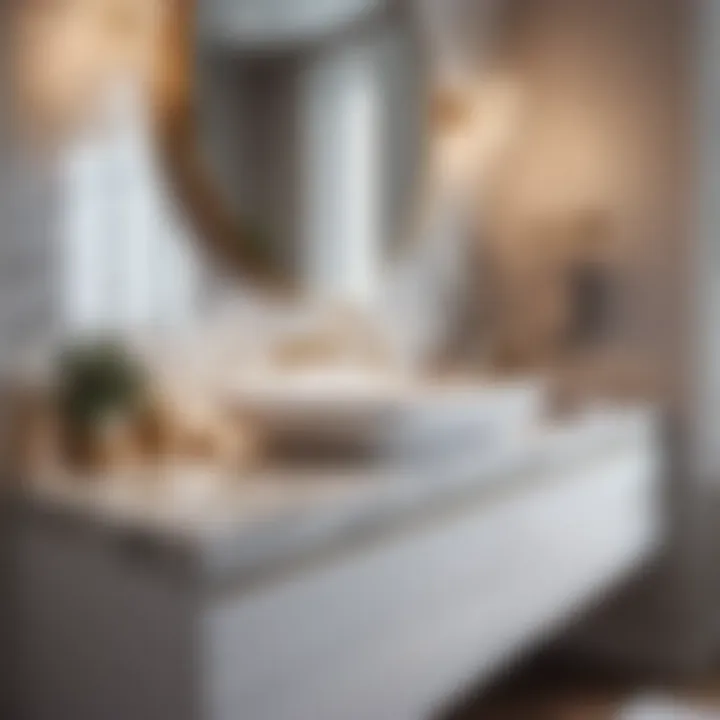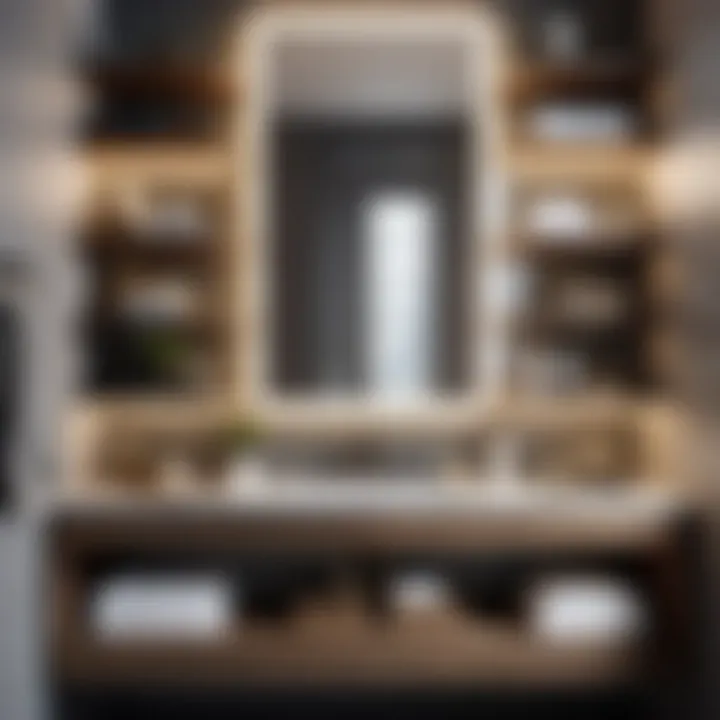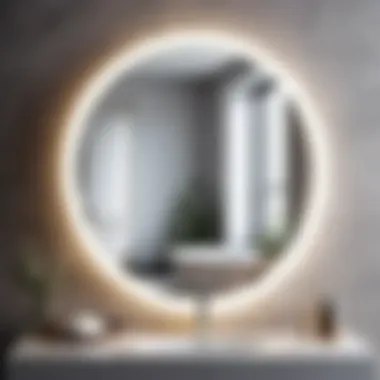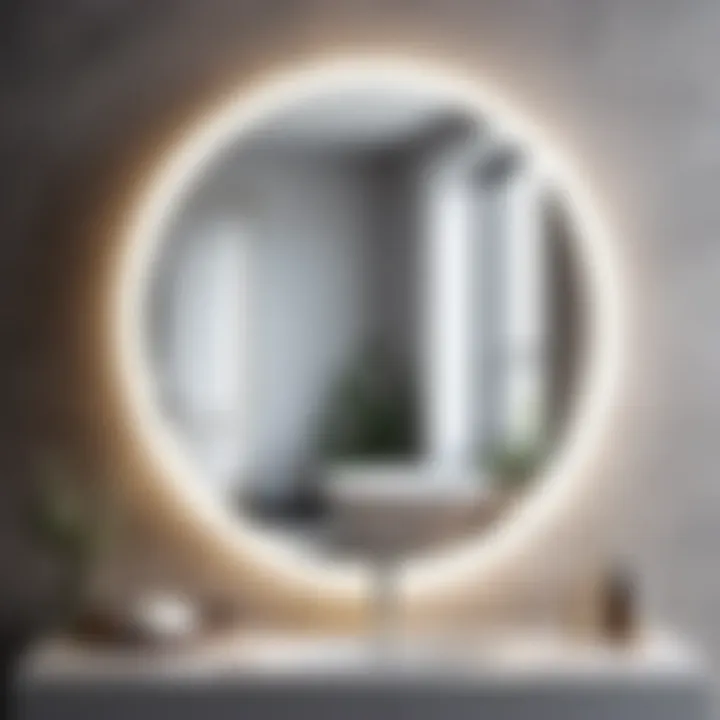Expert Tips for Crafting the Ultimate Bathroom Vanity


Materials:
- Two 24-inch solid wood panels
- One 36-inch marble countertop
- Four drawer pulls
- Wood glue
- Screws
- Drill
- Screwdriver
DIY Steps:
- Begin by measuring your bathroom space to determine the appropriate size for your vanity.
- Cut the solid wood panels to the desired dimensions using a saw, ensuring precision in your cuts.
- Assemble the main structure of the vanity by attaching the panels together using wood glue and screws.
- Install the marble countertop securely on top of the wooden base, ensuring proper alignment.
- Attach the drawer pulls to the drawers, adding a stylish touch to your vanity.
Technical Aspects:
- Tools: Drill, saw, screwdriver
- Timing: Allow for a weekend to complete the project
- Critical Techniques: Ensure accurate measurements throughout the construction process for a flawless finish
DIY Project Process:
- Start by measuring and cutting the wood panels according to your design specifications.
- Assemble the vanity frame following the provided instructions, making sure all joints are secure.
- Carefully place and fix the marble countertop onto the frame, using appropriate adhesive if necessary.
- Attach the drawer pulls to the drawers, ensuring they are installed evenly for a cohesive look.
Troubleshooting Tips:
- If the countertop does not fit perfectly, sand down any rough edges to achieve a seamless fit.
- In case of misalignment during assembly, double-check measurements and make any adjustments as needed for proper fit and function.
Design Considerations
In the realm of creating the ideal bathroom vanity, design considerations play a pivotal role. These considerations are not merely about aesthetic appeal; they encompass a fusion of functionality, space optimization, and stylistic coherence. By delving deep into design considerations, one can ensure that every element of the bathroom vanity harmonizes seamlessly, culminating in a space that exudes both practicality and elegance.
Space Planning
Assessing Available Space
When it comes to designing a bathroom vanity, assessing the available space is fundamental. By meticulously evaluating the dimensions and layout of the bathroom, homeowners can make informed decisions regarding the size and placement of the vanity. This step is crucial in ensuring that the vanity not only fits spatially but also allows for efficient movement within the bathroom. Assessing available space enables individuals to optimize the functionality of the vanity while avoiding overcrowding or spatial imbalance.


Considering Layout Options
The layout of a bathroom vanity can significantly impact the overall look and feel of the space. When considering layout options, homeowners must deliberate on factors such as single or double sink configuration, integrated storage solutions, and accessibility. Each layout option presents its unique set of advantages and considerations, influencing the practicality and visual appeal of the vanity. By carefully selecting an appropriate layout, individuals can tailor the vanity to their specific needs and preferences, enhancing both usability and aesthetic coherence.
Style Selection
Determining Personal Style
Personal style serves as a guiding force in the selection of a bathroom vanity. Whether inclined towards contemporary minimalism or classic elegance, determining personal style sets the tone for the entire design process. This aspect allows homeowners to imbue the space with their individual taste and personality, creating a personalized oasis within the bathroom. The choice of materials, finishes, and design elements reflects the homeowner's unique aesthetic sensibilities, making the vanity a true reflection of their style identity.
Matching Vanity Style to Overall Bathroom Design
Harmonizing the style of the vanity with the broader bathroom design is essential for creating a cohesive and visually appealing space. By aligning the vanity's aesthetics with the prevailing decor scheme, homeowners can achieve a unified look that enhances the overall ambiance of the bathroom. Matching the vanity style to the bathroom design involves careful attention to color palettes, textures, and design motifs, ensuring that every element seamlessly integrates into the cohesive visual narrative of the space.
Materials and Finishes
In the realm of bathroom vanities, the choice of materials and finishes holds paramount importance. The materials used and finishing touches applied not only contribute to the aesthetic appeal of the vanity but also influence its functionality and longevity. When selecting materials, considerations such as durability, maintenance requirements, and design cohesion with the overall bathroom theme play essential roles. Opting for high-quality materials can enhance the value and visual appeal of your bathroom space.
Wood Selection
Wood selection is a critical aspect of crafting the perfect bathroom vanity. Different wood types offer varying characteristics in terms of appearance, durability, and maintenance needs. Understanding the differences between woods helps in choosing the most suitable option for your vanity project.
Choosing between different wood types
Selecting between various wood types involves evaluating factors such as grain patterns, color variations, and natural imperfections. Popular choices like oak, maple, and cherry each bring distinct qualities to the table. Oak, known for its robustness, adds a rustic charm, while maple offers a smooth finish and a contemporary feel. Cherry wood's rich tones lend an elegant and classic touch to the vanity. By weighing these characteristics against your desired aesthetic and practical requirements, you can narrow down the best wood type for your bathroom vanity.
Considering durability and maintenance
Apart from aesthetics, durability and maintenance are crucial considerations when deliberating on wood selection. Some woods, like teak and walnut, are prized for their durability against moisture and wear, making them ideal for high-traffic areas like the bathroom. Maintenance requirements vary based on wood types, with some needing regular sealing or polishing to preserve their beauty. Understanding the maintenance needs of your chosen wood type is essential for ensuring the longevity and pristine appearance of your bathroom vanity.


Countertop Options
The choice of countertop material significantly impacts the functionality and visual appeal of your bathroom vanity. Exploring a range of countertop options allows you to find the perfect match for your design preferences and practical needs.
Exploring various countertop materials
From luxurious marble and granite to sleek quartz and durable laminate, the array of countertop materials available offers diverse aesthetics and functionalities. Marble exudes elegance and sophistication, while quartz provides durability and low maintenance. Laminate countertops offer a budget-friendly yet stylish option. Each material has unique features that cater to different tastes and requirements, allowing you to customize your bathroom vanity to reflect your individual style.
Weighing the pros and cons
When choosing a countertop material, weighing the pros and cons of each option is essential for making an informed decision. Factors such as durability, susceptibility to stains, ease of maintenance, and cost should be carefully considered. While natural stone countertops like granite offer unparalleled beauty, they may require periodic sealing. On the other hand, laminate countertops are budget-friendly but may not withstand heavy use as well as quartz or granite. By evaluating the advantages and disadvantages of each material, you can select a countertop that aligns with your priorities and enhances the overall aesthetic of your bathroom vanity.
Shopping Tips
Shopping for the perfect bathroom vanity is a crucial step in elevating your bathroom space. Proper planning and consideration can significantly impact the overall outcome and ensure that you achieve both functionality and aesthetics. When it comes to shopping tips, there are several key elements to focus on to make informed decisions.
Budget Planning
Setting a Realistic Budget
Setting a realistic budget is fundamental when embarking on a bathroom vanity project. By establishing a clear budget, you can allocate funds efficiently and avoid overspending. A realistic budget takes into account factors such as the cost of materials, labor, and any additional features you desire. This ensures that you stay within financial constraints while still achieving your desired outcome. Setting a realistic budget is a prudent choice for this article as it emphasizes the importance of financial planning in creating a perfect bathroom vanity.
Prioritizing Essential Features
Prioritizing essential features is an integral part of budget planning for your bathroom vanity. By identifying the functionalities and components that are crucial to your needs, you can allocate funds appropriately. This approach helps you focus on key elements that enhance usability and aesthetics while managing costs effectively. Prioritizing essential features ensures that you invest in aspects that align with your preferences and requirements, leading to a customized and practical bathroom vanity design.
Quality Assessment
Examining Construction Quality


Examining the construction quality of a bathroom vanity is paramount to ensuring its longevity and durability. By assessing the materials used, construction techniques, and overall build quality, you can determine the reliability and sturdiness of the vanity. Emphasizing construction quality in this article underscores the significance of investing in a well-built and durable vanity that withstands daily use and maintains its aesthetic appeal over time.
Checking for Warranty and Product Reviews
Checking for warranty coverage and reading product reviews are essential steps in evaluating the quality of a bathroom vanity. Warranties provide assurance against manufacturing defects and product malfunctions, offering peace of mind to consumers. Additionally, studying product reviews offers insights into the experiences of other users, helping you gauge the performance and satisfaction level of a specific vanity model. This approach allows you to make an informed decision based on real-world feedback and ensures that you select a high-quality vanity that meets your expectations.
Installation and Maintenance
When it comes to creating the perfect bathroom vanity, installation and maintenance play crucial roles in ensuring a functional and aesthetically pleasing outcome. Proper installation is essential for the longevity and structural integrity of the vanity, while regular maintenance guarantees its pristine condition over time. In this section, we will delve into the specific elements, benefits, and considerations regarding installation and maintenance.
Professional Installation
Hiring skilled contractors is a pivotal aspect of the installation process that significantly impacts the overall quality of the vanity. Professional installers bring expertise, precision, and efficiency to the project, ensuring that the vanity is impeccably installed for optimal performance and longevity.
Hiring Skilled Contractors
When it comes to hiring skilled contractors for vanity installation, one of the standout features is their experience and training in handling various types of vanities. Their adeptness in assessing the space, understanding the design requirements, and executing the installation with precision make them a popular choice for individuals looking for a seamless and professional outcome.
Ensuring Proper Plumbing Connections
Proper plumbing connections are imperative for the functionality and usability of the vanity. Ensuring that the plumbing is accurately set up not only prevents leaks and potential damages but also guarantees that the vanity operates efficiently. This meticulous attention to detail during installation minimizes future maintenance issues and enhances the overall user experience.
Maintenance Tips
After the installation is complete, maintaining the bathroom vanity is essential for its longevity and aesthetic appeal. Regular maintenance prolongs the life of the vanity and prevents common issues from arising. Let's explore the key maintenance tips that contribute to the upkeep of the perfect bathroom vanity.
Cleaning and Upkeep Recommendations
One of the essential aspects of maintenance is maintaining cleanliness and hygiene. Regularly cleaning the vanity with appropriate products not only preserves its appearance but also prevents the build-up of grime and stains. Implementing a cleaning routine using mild detergents and non-abrasive cleaners helps preserve the finish of the vanity and ensures a pristine look.
Handling Common Issues
Despite proper installation and maintenance, occasional issues may arise with the bathroom vanity. Understanding how to address common problems such as water stains, scratches, or hardware malfunctions is crucial for effective maintenance. Knowing the appropriate solutions and seeking timely repairs or replacements can extend the longevity of the vanity and uphold its functionality.
This comprehensive guide emphasizes the importance of professional installation and routine maintenance in achieving the perfect bathroom vanity. By following these recommendations and guidelines, housewives and homeowners can create a luxurious and functional space that elevates their bathroom aesthetics. Taking a proactive approach to installation and maintenance ensures that the vanity remains a standout feature in the bathroom for years to come.







